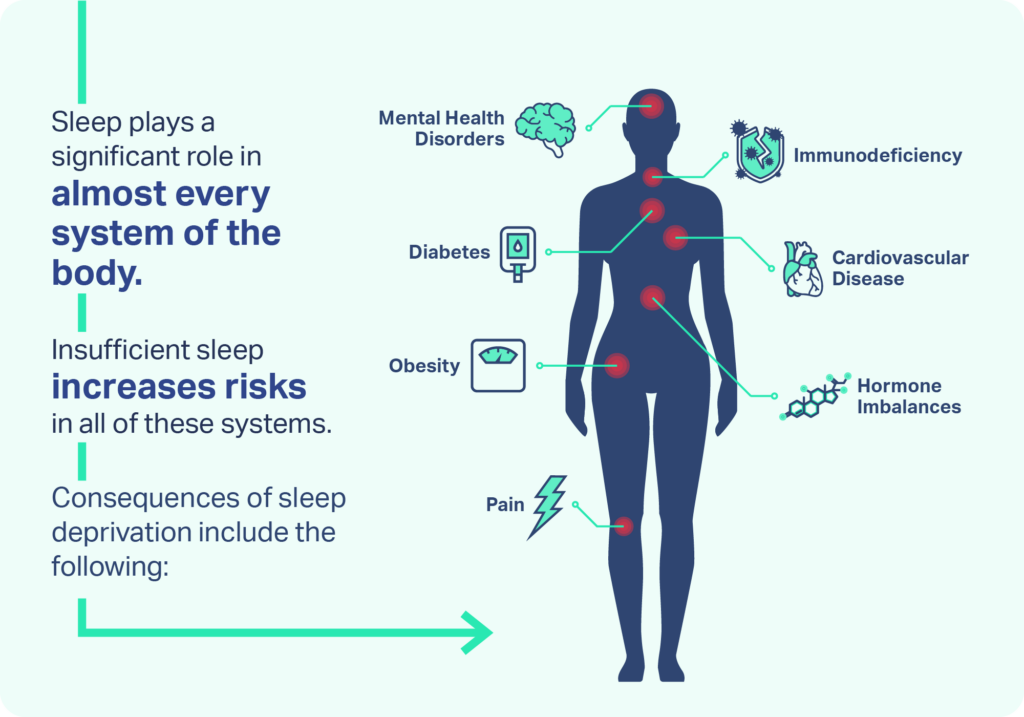
Chronic sleep deprivation, defined as consistently obtaining insufficient sleep or experiencing poor-quality sleep, has significant long-term effects on both physical and mental health. A comprehensive overview of these consequences illustrates the extent to which inadequate sleep can impact individuals across various domains of their lives.
Physical Health Consequences
Sleep plays a pivotal role in maintaining various physiological functions. Prolonged sleep deprivation can lead to several serious health issues, including:
Cardiovascular Disease
Long-term sleep deprivation is linked to an increased risk of developing cardiovascular conditions such as hypertension, heart disease, and stroke. Inadequate sleep disrupts the natural drop in blood pressure that occurs during sleep, which can trigger inflammation and increase cardiovascular risks. Studies have shown that individuals who experience sleep continuity disturbances have heightened chances of developing hypertension, with a notable increase in risk correlating to the severity of sleep issues[3][6][7].
Diabetes and Metabolic Issues
Chronic lack of sleep is associated with insulin resistance and can affect how the body processes glucose, thereby increasing the risk of developing type 2 diabetes. Research indicates that people who sleep less than the recommended 7 to 8 hours per night are at greater risk compared to those who achieve adequate sleep[2][5][6]. Additionally, sleep deprivation has been linked to weight gain and obesity because it disrupts the balance of hormones related to appetite—higher levels of ghrelin (which stimulates hunger) and lower levels of leptin (which signals fullness) are common in sleep-deprived individuals[4][6][7].
Immune Function
Sleep is crucial for a well-functioning immune system. Chronic sleep deprivation weakens immune response, making individuals more susceptible to infections and illnesses. For instance, sleep deprivation can lead to a decreased response to vaccinations and a heightened risk of common infections like the flu[2][4][6].
Hormonal Imbalance and Growth Disruption
Insufficient sleep affects hormone production, including cortisol and growth hormones. This can disrupt normal growth and development in children and adolescents, potentially leading to long-term health issues related to growth and metabolism[4][7]. Furthermore, disrupted sleep can severely impact mood-regulating hormones, contributing to significant mental health consequences[6][7].
Mental Health Implications
Inadequate sleep has profound effects on mental well-being, with implications that can affect both daily functioning and deeper psychological states.
Cognitive Impairment
Lack of sleep interferes with cognitive processes such as attention, problem-solving, and decision-making. It impairs learning capabilities and memory retention, leaving individuals less capable of processing information and more prone to mistakes. Chronic sleep deprivation can lead to persistent cognitive deficits, affecting overall productivity and emotional regulation[6][6][7].
Mood Disorders
Long-term sleep deprivation is closely linked with mood disorders, including anxiety and depression. Studies have shown that individuals with sleep deprivation experience increased feelings of stress, irritability, and mood swings. In extreme cases, chronic sleep loss can lead to more severe mental health issues, including hallucinations and severe psychological distress[5][6][7]. Furthermore, sleep problems have been correlated with higher incidences of suicidal ideation, particularly in adolescents[5][6].
Behavioral Issues in Adolescents
For children and teenagers, the impact of sleep deprivation can manifest as behavioral problems, difficulty in social interactions, and academic performance decline. Sleep-deprived teenagers may exhibit risk-taking behaviors and struggle with mood regulation, contributing to overall poor mental health and strained relationships[4][6].
Lifestyle Factors Contributing to Poor Sleep
Several factors contribute to chronic sleep deprivation, making it crucial for individuals to identify and modify their sleep habits. Common contributors include:
Poor Sleep Hygiene: Engaging in stimulating activities before bedtime, such as using electronic devices, can hinder sleep onset and quality. Establishing a calming bedtime routine is vital for preparing the body for sleep[1][4].
Work Demands and Lifestyle Choices: Busy schedules often force individuals to sacrifice sleep for work or personal interests. This is exacerbated for individuals with shift work or irregular schedules, which disrupt natural circadian rhythms[3][6].
Stress and Anxiety: Elevated stress levels, whether from personal or professional life, can lead to difficulty falling and staying asleep. Techniques for stress management are crucial in mitigating these effects[4][7].
Medical Conditions and Sleep Disorders: Undiagnosed conditions like sleep apnea and restless legs syndrome can significantly impair sleep quality, necessitating professional intervention[6][7].
Addressing Chronic Sleep Deprivation
Given the serious implications of chronic sleep deprivation, prioritizing sleep health is essential. Suggested strategies include:
Establishing a Consistent Sleep Schedule: Going to bed and waking up at the same time daily helps regulate the body's internal clock, improving sleep quality[7].
Improving Sleep Hygiene: Creating a comfortable sleep environment, minimizing screen time before bed, and avoiding stimulants like caffeine can enhance sleep quality[6][7].
Seeking Professional Help: If sleep problems persist despite lifestyle changes, consulting a sleep specialist may be necessary. They can provide insights and treatments tailored to specific sleep disorders[6][7].
In conclusion, the long-term effects of poor sleep are extensive and multifaceted, impacting both physical health and mental well-being. Understanding these effects and making concerted efforts to improve sleep hygiene can significantly enhance one's overall health and quality of life.
Get more accurate answers with Super Pandi, upload files, personalized discovery feed, save searches and contribute to the PandiPedia.
Let's look at alternatives:
- Modify the query.
- Start a new thread.
- Remove sources (if manually added).